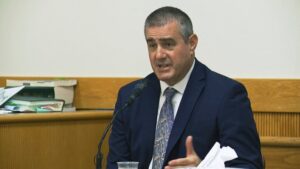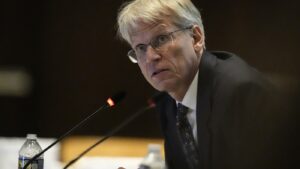ORLANDO, Fla. — Jared Isaacman, a former nominee for NASA administrator, has expressed interest in pursuing ambitious space exploration goals independently. Speaking at the International Space Development Conference in Orlando, Isaacman received the National Space Society’s Wernher von Braun Award on June 21 for his role in commanding the private astronaut mission, Polaris Dawn, scheduled for September 2024.
This award ceremony marked one of Isaacman’s first public appearances since the White House withdrew his nomination for NASA administrator three weeks prior. During his speech and a subsequent fireside chat, Isaacman focused on his spaceflight experiences rather than his nomination, although he had previously discussed his vision for NASA in a podcast.
Ambitious Goals from Outside NASA
Isaacman emphasized his desire for NASA to prioritize groundbreaking programs and reduce bureaucratic hurdles. He stated, “It was just getting the agency back to doing again the near-impossible. There’s just a lot of ‘littles’ that were going on that are all pretty cool, but a lot of them could be done by others.”
Had he been confirmed as NASA administrator, Isaacman’s priorities would have included returning humans to the moon and setting a clear path toward Mars exploration. He also advocated for investment in nuclear electric propulsion (NEP), a technology he believes is crucial for Mars missions.
Isaacman expressed interest in transitioning the Space Launch System (SLS) states towards NEP, aiming to phase out the SLS. He noted that NASA’s Marshall Space Flight Center in Alabama, responsible for SLS work, is also involved in nuclear propulsion technologies.
Partnerships and Academic Collaborations
Another significant goal for Isaacman was fostering partnerships with academic organizations for missions where these institutions could play a larger funding role. “My priorities would have been leadership in space and the orbital economy,” he stated, “and trying to introduce a concept where NASA could help enable others to conduct interesting scientific missions, getting academic organizations to contribute.”
Isaacman suggested that he might pursue this vision outside of NASA, saying, “I wouldn’t mind maybe trying to put that to a test and see if you could fund an interesting robotic mission, just to show that it can be done, and try and get some of the top-tier academic institutions who want to perform. So that’s on my mind.”
Impact of Budget Cuts
The withdrawal of Isaacman’s nomination coincided with the release of NASA’s fiscal year 2026 budget proposal, which proposed a nearly 25% reduction in overall NASA spending, with more significant cuts in science and space technology areas. Notably, the budget eliminated funding for nuclear propulsion, citing the high costs and extended development timelines.
“Efforts are costly investments, would take many years to develop, and have not been identified as the propulsion mode for deep space missions,” the budget proposal stated.
Despite these setbacks, Isaacman remains optimistic. During his fireside chat, he remarked, “When you zoom out a little bit from this turbulence, you’re going to see this is the best time in human spaceflight since probably the first chapter in the 1960s.”
Private Sector’s Role in Space Exploration
Isaacman highlighted the significant contributions from wealthy individuals like SpaceX founder Elon Musk and Blue Origin founder Jeff Bezos, who are investing heavily in space capabilities. “You have the wealthiest people, like two wealthiest people in the world, that are happy to commit their resources on enabling capabilities for space to be experienced by the many, for us to go beyond the boundaries of our planet,” he noted.
His Polaris Dawn mission was intended as the first of three missions he planned to fund. However, these plans were put on hold following his NASA nomination. Currently, Isaacman is taking a break to spend time with his family, marking his first extended hiatus from work since the age of 16.
Future Prospects
While Isaacman is currently focused on personal time, he has not ruled out a return to space. “I don’t think I’ve flown my last mission, but I’m not necessarily sure exactly what form that may take. So, we’ll have to see,” he concluded.
As the space industry continues to evolve, Isaacman’s potential contributions from the private sector could offer new opportunities for collaboration and innovation, potentially reshaping the landscape of space exploration.







